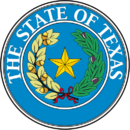Texas judicial district 9
 From Ballotpedia - Reading time: 8 min
From Ballotpedia - Reading time: 8 min
| Local Courts |
|---|

|
| Trial courts and judges |
| Elections by state |
| Judicial selection by state |
| View courts by state: |
Ballotpedia provides comprehensive election coverage of the 100 largest cities in America by population as well as mayoral, city council, and district attorney election coverage in state capitals outside of the 100 largest cities. This page is outside of that coverage scope and does not receive scheduled updates.
The Texas 9th District Court resides in Texas. Click on the links below to learn more about the court's...
Jurisdiction[edit]
This court holds the following jurisdiction:[1]
| “ | The district courts are the trial courts of general jurisdiction of Texas. The geographical area served by each court is established by the Legislature, but each county must be served by at least one district court. In sparsely populated areas of the State, several counties may be served by a single district court, while an urban county may be served by many district courts.
District courts have original jurisdiction in felony criminal cases, divorce cases, cases involving title to land, election contest cases, civil matters in which the amount of money or damages involved is $200 or more, and any matters in which jurisdiction is not placed in another trial court. While most district courts try both criminal and civil cases, in the more densely populated counties the courts may specialize in civil, criminal, juvenile, or family law matters.[2] |
” |
Selection method[edit]
- See also: Judicial selection in the states
- See also: Partisan election of judges
The judges of the Texas District Courts are chosen in partisan elections. They serve four-year terms, after which they must run for re-election if they wish to continue serving.[3]
Though Texas is home to more than 400 district courts, the courts are grouped into nine administrative judicial regions. Each region is overseen by a presiding judge who is appointed by the governor to a four-year term. According to the state courts website, the presiding judge may be a "regular elected or retired district judge, a former judge with at least 12 years of service as a district judge, or a retired appellate judge with judicial experience on a district court."[4]
Qualifications
To serve on the district courts, a judge must be:
- a U.S. citizen;
- a resident of Texas;
- licensed to practice law in the state;
- between the ages of 25 and 75;*[5]
- a practicing lawyer and/or state judge for at least four years; and
- a resident of his or her respective judicial district for at least two years.[3]
*While no judge older than 74 may run for office, sitting judges who turn 75 are permitted to continue serving until their term expires.[3]
Judicial elections in Texas[edit]
- See also: Texas judicial elections
Texas is one of five states that uses partisan elections to select judges and does not use retention elections for subsequent terms. To read more about how states use judicial elections to select judges across the country, click here.
Primary election[edit]
Partisan primaries are held if even one candidate has filed for a position. To advance to the general election, a candidate must win a majority (over 50 percent) of the vote. If no candidate in a race wins the majority—as in cases where more than two candidates are competing for a seat—a runoff election is held between the top two candidates.[6][7]
Though Texas officially has closed primaries (requiring that voters declare party affiliation in advance in order to participate), the state's primaries are functionally open: registered voters may vote in any single party's primary if they have not voted in the primary of another party. The elections are closed, however, in that voters may not participate in the proceedings (a runoff primary or a convention) of another party thereafter.[6]
General election[edit]
The winning candidates from each major party's primary, as well as any additional minor party candidates, compete in a general election on the first Tuesday after the first Monday in November. If a candidate was unopposed in the general election, his or her name will still appear on the general election ballot.[6][8]
See also[edit]
External links[edit]
Footnotes[edit]
- ↑ Texas Judicial Branch, "About Texas Courts," accessed May 22, 2023
- ↑ Note: This text is quoted verbatim from the original source. Any inconsistencies are attributable to the original source.
- ↑ 3.0 3.1 3.2 American Judicature Society, "Methods of Judicial Selection: Texas," archived October 3, 2014
- ↑ Texas Courts Online, "Administrative Judicial Regions," accessed September 12, 2014
- ↑ Texas State Historical Association, "Judiciary," accessed September 12, 2014
- ↑ 6.0 6.1 6.2 The University of Texas at Austin: Texas Politics, "Winning Public Office: General Elections and Special Elections," January 29, 2014
- ↑ Texas Election Code, "Title 10, Sec. 172.003 and 172.004," accessed May 1, 2014
- ↑ Office of the Secretary of State, 1992-Current Election History (Select "2012 General" & "County Race"; then click "Anderson" to view sample results)
Federal courts:
Fifth Circuit Court of Appeals • U.S. District Court: Eastern District of Texas, Western District of Texas, Northern District of Texas, Southern District of Texas • U.S. Bankruptcy Court: Eastern District of Texas, Western District of Texas, Northern District of Texas, Southern District of Texas
State courts:
Texas Supreme Court • Texas Court of Appeals • Texas Court of Criminal Appeals • Texas District Courts • Texas County Courts • Texas County Courts at Law • Texas Statutory Probate Courts • Texas Justice of the Peace Courts
State resources:
Courts in Texas • Texas judicial elections • Judicial selection in Texas
 KSF
KSF


